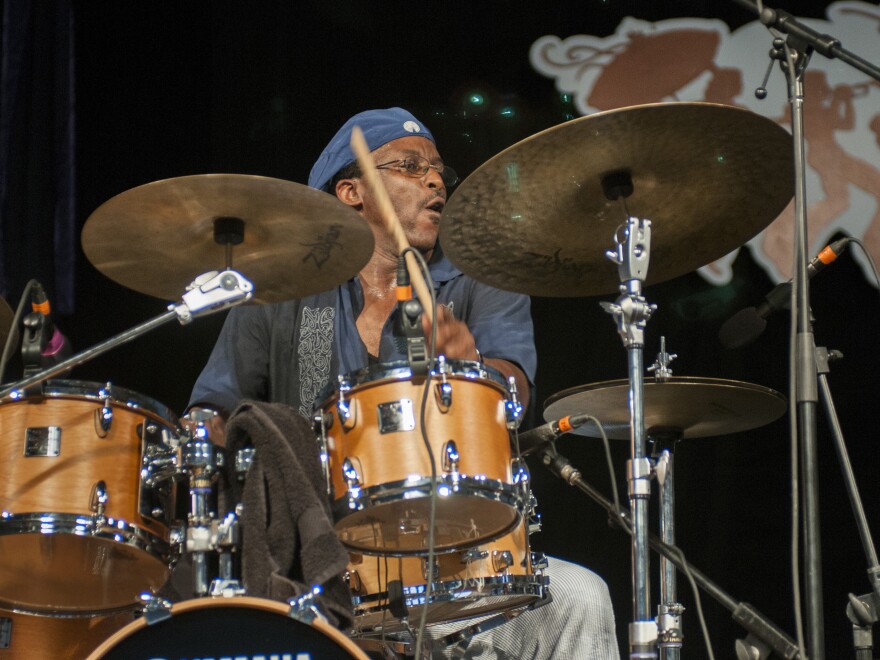It's a Wednesday night in the venerable Bayou Bar of the Pontchartrain Hotel in New Orleans – one of the best (and least publicized) jazz gigs in the city known as the cradle of jazz.
Herlin Riley is presiding. The 66-year-old drummer sits at his drums like a prince before his court. The tavern is packed because when Riley plays, there's always a crowd. He is one of America's most revered and distinctive drummers. Tonight, the audience will know why.
You can't take your eyes off of Herlin Riley or you might miss something. He's twirling his sticks in the air like a Vaudeville drummer. He's playing everything: cowbell, wood block, tambourine, the drum shell, the other drum stick. On one tune, he drops his left stick and plays the drumhead with his hand like a bongo. On another tune, an admiring waiter holds out a water pitcher in the middle of his solo and he beats out a rhythm on that. Later, the same waiter – is he part of the act? – hands him a glass of red wine. Riley holds the wine in one hand while playing a rollicking one-stick solo with the other, keeping time with the bass drum and high-hat cymbals.

Throughout the show, he has a euphoric smile that says he's having more fun than anybody else in the room.
To recycle an old descriptor: Riley is a living legend. He's played with jazz and R&B greats Ahmad Jamal, Wynton Marsalis, Danny Barker, Dr. John and Marcus Roberts, and remains one of the most in-demand drummers here in the city that gave America rhythm.

"If you ask musicians, he can swing harder than anybody else," says Derek Douget, a tenor saxophonist from Gonzales, Louisiana, who regularly plays with Riley at the Bayou Bar. "He's played music for so long that he can express whatever he wants to on the drums."
Wynton Marsalis is managing and artistic director of Jazz at Lincoln Center, whose big band Riley played and recorded with for 17 years. Riley helped develop the drum parts to Marsalis' Pulitzer Prize-winning album, Blood on the Fields. He and Riley have known each other since they were teenagers, playing in the storied Fairview Baptist Church Marching Band. Marsalis says when he hears Riley play the drums, he hears joy, spirituality, accuracy, and a musical ability that is encyclopedic in its scope.
"Herlin can play all kinds of stuff...from a burlesque show to playing with Ahmad Jamal to playing New Orleans parades to playing all the symphonic stuff we played," says Marsalis.
Riley's playing is profound, not only because he represents the quintessence of jazz, but also because he has the bloodline. He is part of the Lastie musical dynasty in New Orleans. His grandfather, drummer Frank Lastie, jammed with the young Louis Armstrong when they both spent time at a juvenile detention center called the Colored Waif's Home around 1915. Frank Lastie went on to become a deacon who is credited with introducing the drums in church.
"[Riley] has a kind of ancient wisdom and understanding that informs his sound," says Marsalis, who comes from another New Orleans musical family headed by the late patriarch, pianist Ellis Marsalis.
Riley recalls: "I heard my grandfather playing these New Orleans street beat rhythms on the kitchen table using butter knives. After we'd have some toast and some eggs, he'd spread the butter on the bread, and he'd wipe the butter knives off and then we'd have a game. And he'd play these rhythms for me on the table. And he challenged me to do them."
The whole Lastie family was musical. In addition to his grandfather, his uncles were all professional musicians – saxophonist David Lastie Sr., trumpeter Melvin Lastie, and drummer Walter "Popee" Lastie. From them he imbibed the sounds of shuffles, swing, funk, soul and blues.
And there was the influence of the sanctified church. "I started playing the tambourine after watching ladies in church play it," Riley says.
Riley regularly takes his music on the road. Over the summer he played with New Orleans native and multi-Grammy-winning pianist Jon Batiste at the Élysée Palace in Paris for President Emmanuel Macron. And in late November he was in New York City to play at the prestigious Dizzy's Club Coca-Cola and on Live From Emmet's Place, the popular, live-streamed jazz concert series that takes place in pianist Emmet Cohen's Harlem apartment.
"He's one of the last of his kind," says Dave Torkanowsky, a veteran New Orleans pianist who's been playing with Riley their whole adult lives. "And by that I mean, directly connected to the origins of improvisational American music. You can hear the ancestry in his playing... You can't help but feel it."
But Riley takes his renown as one of America's greatest living drummers with a grain of salt.
"I appreciate the respect," he says, "but I don't take it seriously. I take it very lightly. Because I'm a strong believer in God and everything we have is by God's grace."
"So I don't get too full of myself," he continues, "I don't get too full of ego. I'm not the greatest, I'm just one of his vessels, one of the people that he put the light in."
Copyright 2024 NPR. To see more, visit https://www.npr.org.



